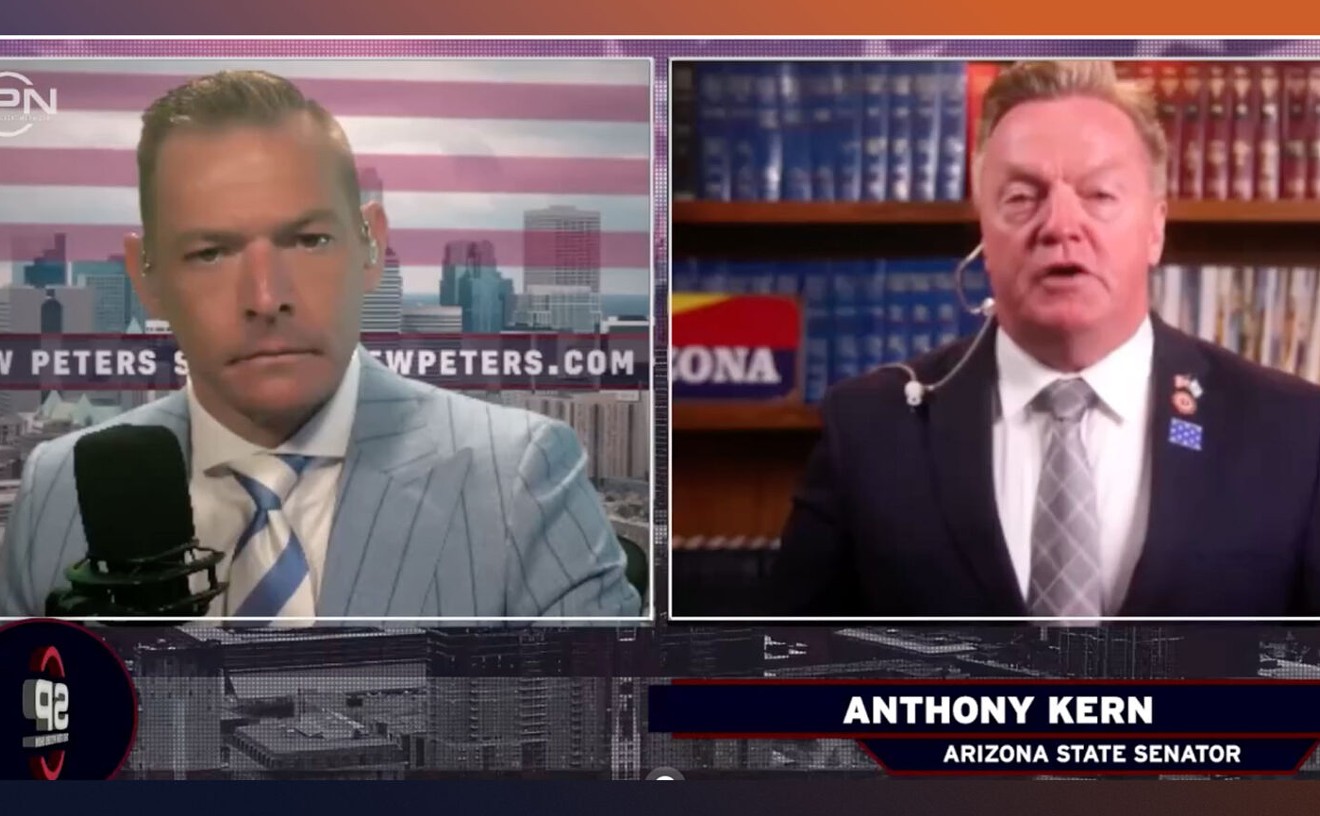Critics accuse Doug Wilson & Associates Incorporated, the private consulting firm hired to put Phoenix on the international map, of using its inside position to hustle business from the foreign dignitaries attracted to city-sponsored events. Critics also claim the consultant is short-changing its obligation to provide staff support to Phoenix's six sister-city committees.
"The staff is really unresponsive and unhelpful," says Alfredo Estrella, a Phoenix businessman on the Hermosillo (Mexico) Committee, a branch of Phoenix Sister Cities Commission. "Doug Wilson is collecting $50,000 a year from the City of Phoenix to run this office, and he's using the position to better his own consulting firm."
Wilson is listed as Phoenix's Chief of Protocol in the City Hall directory, and his company vice president Colleen Crahan bears the title Deputy Chief of Protocol. Wilson denies any wrongdoing.
"Can I guess who is making these claims?" Wilson says. "Alfredo Estrella? I know he's been going around saying I was trying to get business for the firm through my position with the city.
"It is absolutely untrue," asserts Wilson. "We are very careful not to do any work for the firm on city time or city property."
Estrella claims, for instance, that recently he was present at City Hall as Colleen Crahan conducted a ten-minute telephone conversation with a colleague in the Doug Wilson & Associates' office in north Phoenix. He also claims that members of the firm were overheard cultivating business contacts among a delegation of Mexican officials in Phoenix. Wilson, however, says his firm has never used city functions to curry new clients, nor does it conduct company business out of the city's Protocol office, located on the fourth floor of the old City Hall in downtown Phoenix.
"Colleen has been working on an upcoming Asia trip for some of the city officials, and she was talking to one of our colleagues who has a lot of expertise in that area," Wilson explains.
"Alfredo has a real problem," contends Wilson, who characterizes Estrella as an angry man given to threatening employees.
"He became angry over problems with a project on which he was working and became very harassing and abusive to some of the women on my staff. One person was even afraid to come to work because of his behavior." Estrella admits things between him and the Protocol office staff got ugly, but claims that he was "screeched at" by a Wilson aide when he aired his gripes about the staff's "lack of support."
Even if Estrella had caused all the trouble that Wilson implies, he's not alone in sending up flares about the city's privatized Office of Trade and Protocol. Apart from the conflict-of-interest question, some committee members are unhappy with the consultants' performance as staff members to the sister-city committees.
"I've never felt less appreciated as a volunteer--and I do a lot of volunteering with a lot of different organizations," says Diana Pierce Nelson, a member of the Himeji (Japan) Committee. "My experience has been such that, if I weren't so committed to the concept, I wouldn't still be on the committee."
Nelson gropes carefully for some diplomatic language to describe the problem, and finally says, "The staff doesn't have the same perception of their role as the committees do.
"On every other volunteer service organization I've been involved with, the feeling was that the staff was there to support the volunteers," Nelson says. "On the Sister Cities Commission, I've gotten very much the opposite impression--that we're their gofers, and they are calling the shots."
At the very least, the city's unusual arrangement with Wilson--the contract was given to Wilson without being put out for competitive bids--illuminates the potential pitfalls of privatizing public service.
"It is an awkward position because the potential for a conflict of interest is always there," says Rudy Armijo, chairman of the Hermosillo Committee. "I personally have no knowledge of any wrongdoing on Doug's part, but it is always a question that can come up, because in terms of promoting exports and the other functions of the Protocol office there's always the possibility for a private consultant to cross the line and promote their own business at the same time they are doing city business."
City officials admit it is unusual for a titled city official to be, in actuality, a private contractor, but say the concept was motivated by good intentions. "This was a creative approach, a new way to get work done for the community in efficient and effective ways," says Phoenix City Manager Frank Fairbanks.
In the late 1980s, privatization--contracting with private companies to perform government functions--was the trendiest buzz word in the lexicon of young bureaucrats. And Doug Wilson embodied all the qualities Terry Goddard's image-conscious administration wanted in such a high-profile position. Wilson, an Arizona native, had two degrees in international relations and two decades of experience in the U.S. Foreign Service and as an adviser to former presidential hopeful Gary Hart.
Wilson and Goddard met through the former mayor's involvement with the National League of Cities and Towns. Goddard created a position in the mayor's office for Wilson, explains Jack Tevlin, a deputy city manager who served as Goddard's chief of staff. "Doug's original job was to handle protocol matters and assist the Sister Cities Commission," Tevlin says. "But the program has expanded over the years far beyond that, and now includes international trade development, with an emphasis on attracting foreign air carriers to Sky Harbor."
In 1989, Wilson, whose position had been funded jointly by two quasi-public agencies, Phoenix Sister Cities Commission and Phoenix Economic Growth Corporation, decided to form his own consulting firm. He sought a contract to handle the city's international relations program, Tevlin recounts. "We cleared it with the city attorney to create a comfort level so that there would be no conflict."
After Goddard left office, Tevlin became a deputy city manager and Wilson continued to report to him. "The contract has not been bid out," Tevlin confirms. "It just kind of grew out of the initial contract with Doug as an individual and has continued that way.
"We evaluate it each year in terms of what our goals are, and what they have accomplished," Tevlin says. "Our view so far is, they've done one helluva job for us."
Phil Robbins, president of Phoenix Sister Cities Commission, echoes Tevlin's praise for the Wilson group. "My impression is that Doug Wilson and his staff are very dedicated and spend enormous amounts of their own time on projects for the sister-city committees.
"I've been associated with the Sister Cities Commission since the 1970s and Doug has accomplished a tremendous amount for the city," Robbins comments.
Robbins says he's aware of Estrella's criticism, but characterizes Estrella as "totally unreliable."
Informed that several other people on the sister-city committees shared Estrella's concerns, Robbins responds, "I would be real surprised if that represented a consensus of the committee members."
Nevertheless, Robbins encourages critics to bring their concerns to him. "They won't get a deaf ear from me," he says.
"I know he's been going around saying I was trying to get business for the firm through my position with the city."
He may be a hotheaded troublemaker, but he's not alone in sending up flares about the city's privatized Office of Trade and Protocol.
In the late 1980s, privatization was the trendiest buzz word in the lexicon of young bureaucrats.










